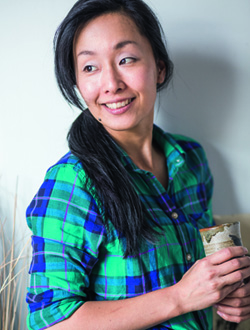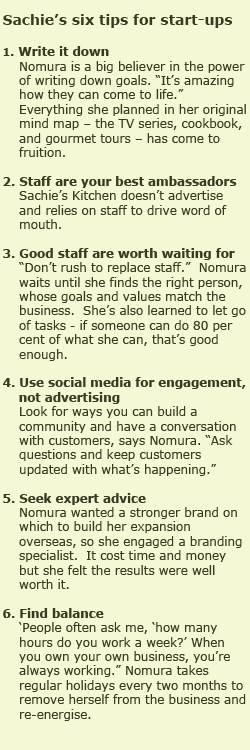-
Escaping a grey, dreary Auckland morning into Sachie Nomura’s gently humming cooking school is something of a relief. Delicious things are sizzling, and cooks are quietly bustling about the kitchen stations, making handmade sushi that will sell out within 15 minutes of opening time.

Proudly framed on the wall near the entrance is a scrap of paper with a mind map sketched on it in felt pen. “Sachie’s Kitchen” is in the centre, with ‘cook school’ ‘TV show’ and ‘gourmet tours’ coming off it in colourful little bubbles.
Four years ago Sachie’s Kitchen was just that – a little mind map and a big dream. Fast forward to 2014 and ‘Sachie’s Kitchen’ is now a Kiwi business success story about to take on the world.
First and foremost an Asian cooking school in Auckland, New Zealand, the Sachie’s Kitchen brand has expanded to include a TV series (recently sold internationally to 12 countries) and a cookbook of the same name.
Demand for classes is so great (10,000 happy cooks and counting) the kitchen is expanding into the building next door and Nomura will soon be piloting classes in Sydney. There’s also a partnership with Auckland Airport to deliver gourmet food tours to Asian visitors to New Zealand.
It’s a lot to achieve in four short years. So how did Japanese-born Nomura turn her start-up dream into reality?
Meeting Nomura for the first time, it’s not hard to see why she’s so successful. She’s gorgeous, passionate and engaging and, frankly, downright inspirational.
It all started when she was working as a Business Development Manager at an Auckland hotel. Shockingly, two colleagues’ friends died of heart attacks on the same day. Both were in their early 40s.
“I thought: I could die tomorrow. And I heard my mum’s voice in my head: if there’s something you really want to do, you should do it, and work hard. It doesn’t matter if you fail, as long as you have tried.”
Inspired, she created the mind map of what she wanted to achieve, which would later form the basis of her business plan. She approached her Chinese husband Nick with the idea and they agreed she would take one year off work to see if the business was viable.
“And we never looked back,” she says with evident satisfaction.
Turnover this year is up 35 per cent on last and the projection for 2014 is significantly greater, given the premises expansion and book launch, says Nomura.
She began hosting the cooking classes from home, using skills learnt from living with Japanese chefs. Bigger groups were accommodated in hired venues until she was able to establish premises in Parnell, an inner suburb of Auckland.

“One good thing about starting a business in the recession was that I had a lot of choice,” Nomura says of the location.
She borrowed a small amount of start-up funding from a family member but paid it back within six months. Since then, the business has been able to operate with no debt.
Nomura is a big believer in the power of writing down goals. “Recently I was sorting through some boxes and I found an old journal where I’d visualised what my life would look like in five years’ time. Everything on it – all the things I had written down – had happened.”
Nomura believes the biggest secret to her success is finding the right staff and letting them get on with the job. The business now employs nine people.
Sachie’s Kitchen doesn’t advertise, relying on the team to drive word of mouth.
“If customers are happy, they will tell people,” Nomura says. “If they’re not happy, they will also tell people. So it puts a bit of pressure on staff to know that we don’t do advertising, and encourages them to give 100 per cent.”Nomura has developed a relationship with local training institutions so she can hand pick the best graduates. Training can take up to 12 months, and all new recruits start at the bottom, despite any previous experience.
She also doesn’t rush to replace people when they leave.
“Often people want to hire the first person who comes along, because they think – we have to fill that spot. But it’s important to choose someone with the same goals and values to make sure they are the right fit with the business.
“They have to care about our brand, take pride in Asian history and culture and want to give back to Kiwis.”
It hasn’t always been smooth sailing. Nomura initially found it difficult to trust staff members with tasks, so did most of the work herself.
A turning point came when, tired and worn out, she collapsed while teaching a class.
It was a big lesson.
“My husband said to me ‘you will never achieve scalability if you don’t trust others. ‘If they can do 80 per cent of what you do, can’t that be good enough? Then you just need to pick up 20 per cent.’
“So I decided to let go.”
Owning a business can be all-consuming and one of Nomura’s critical strategies is to take regular holidays every two months to avoid burning out.
You can find Sachie’s Kitchen on Facebook, Twitter and Instagram but rather than seeing social media as an advertising channel, Nomura prefers to use it to ‘build a community’.
“For me it’s more about having a conversation with customers, to tell them what is happening in the kitchen, to give away cookbooks, or share recipes,” she says.
Did she face any challenges being a young woman starting a business in a foreign country?
“No. New Zealand has been very kind to me. In fact it was probably an advantage to be young, female and Asian because no one else was doing it.”
Find out more about Sachie’s Kitchen at www.sachieskitchen.com.
Jessamy Malcolm Cowper - External Communications Manager, ANZ New Zealand.
Photo: © Sachie’s Kitchen By Sachie Nomura. Published by HarperCollins New Zealand.
The views and opinions expressed in this communication are those of the author and may not necessarily state or reflect those of ANZ.
anzcomau:Bluenotes/business-finance
From Japan, via New Zealand with a little help from China: secrets of a global cooking business
2014-07-11
